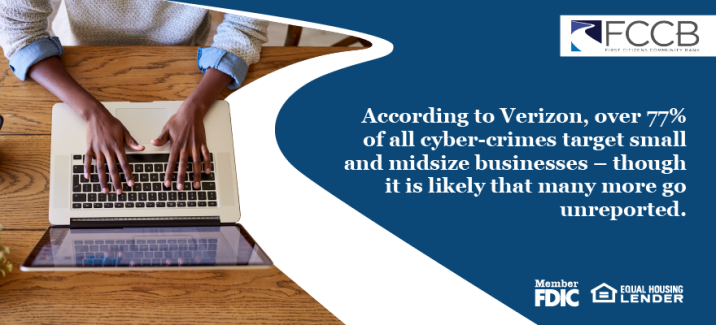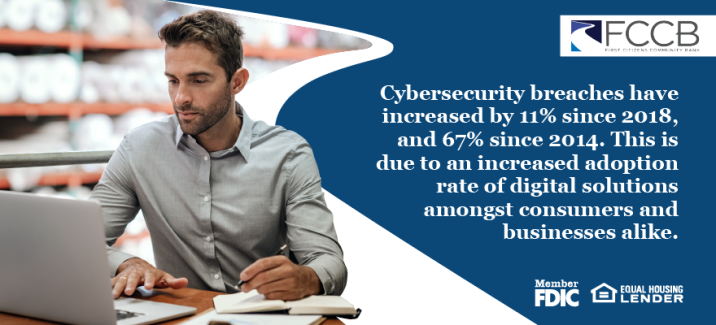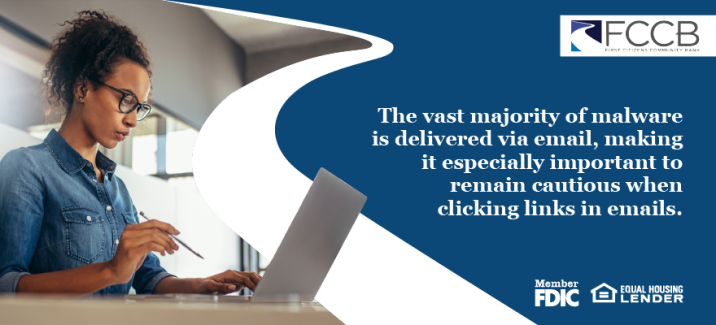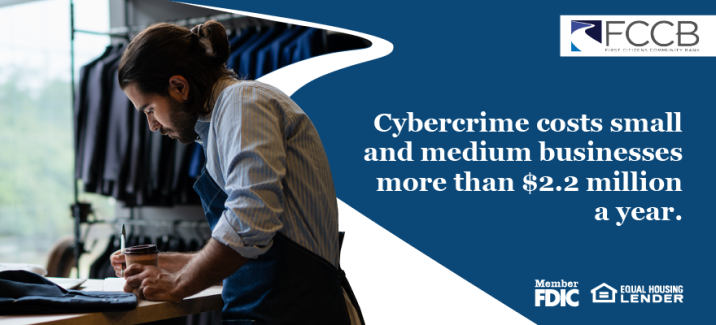Essential Cybersecurity Tips for Your Small Business
02/02/2022
As a small business owner, you may think you’re not as much of a target as the larger companies whose data breaches end up in the news. However, businesses with less than 100 employees are increasingly finding themselves targeted in cyberattacks. Scammers know that small businesses often do not have the same IT resources as larger companies. Therefore, the “small fish” is an easy target. Follow these tips to protect your small business from the financial and operational costs of a cyberattack.

Secure Your Wi-Fi networks
If you have a Wi-Fi network for your workplace, make sure it is secure, encrypted, and hidden. This will add one more layer of security to your network, making it more difficult for potential hackers to find and exploit. To hide your Wi-Fi network, set up your wireless access point or router, so it does not broadcast the network name, known as the Service Set Identifier (SSID). You should also set up password protection for the router itself. Also, change the default router's name so that it does not appear to belong to your business, especially if you are surrounded by other businesses with networks that overlap yours. This can help you from being targeted.
Enact Company-Wide Password Policies
Be sure to preach password security to all of your employees, and follow best-practices for your passwords. Ensure that employees are using passwords for all of their devices as well as two-factor authentication (2FA).
Also known as multi-factor authentication (MFA), 2FA adds a second layer of protection for your online accounts and devices by requiring another token for verification in addition to login credentials. For example, common tokens include security questions, fingerprints, and temporary pins sent to your email or phone number.
Strong passwords are:
- Unique, so don’t reuse passwords.
- Long, so aim for at least 12 characters.
- Hard to guess, but easy for you to remember, so use a password manager or try a lyric or quote that is meaningful for you. Don’t use personal information such as birthdays or common words and phrases.

Offer Employee Security Training
Your business security is only as strong as your weakest link. Make sure all of your employees are updated on the latest security concerns in your industry, how to spot scams and phishing emails, etc. You can use a third-party to provide required training videos for employees and even set up fake phishing emails designed to test your employees' knowledge of this topic.
When it comes to using company-owned mobile devices, employees should password-protect their devices, encrypt the data they transmit, and use a VPN. You should also think through and create a reporting process for lost or stolen devices.
Keep Your Company Devices Up-to-Date
Your devices should automatically receive vital updates to protect them against cybersecurity threats, but don’t procrastinate on installing these. These updates are designed to keep your devices protected against the latest threats, so failing to install these updates opens you up to greater risks. Again, this applies to all devices within your company such as smartphones, tablets, and computers.
In addition to devices, make sure you’re running the latest web browser and operating system to protect your business data against viruses, malware, and other cyber threats. Firewall security for your Internet connection is also important. If you have any employees working from home, be sure to protect their home setup with a firewall.
Utilize Security Software
Be sure to use antivirus software that is designed for businesses. With so many employees clicking on links online, this increases your business' risk of contracting a virus. If you want to minimize your risk even further, you could add browser limitations to prevent your employees from accessing potentially dangerous websites that are a common source of viruses. And, of course, keep your anti-virus and ransomware software updated.

Make Regular Backups
Have a schedule and stick to it for making backups of your vital data. This includes word processing documents, spreadsheets, databases, financial records, HR files, and accounting files. Schedule weekly backups and decide whether you want to store copies offsite or in the cloud.
While automatic backups are helpful to safeguard you against system failures, it can also be a great way to protect you from ransomware. Ransomware is a type of malware that allows hackers to hold your information hostage, and demand a hefty fee for its return. If you have a current backup of your important information, then you are at a much lower risk of having your data put at risk.
Safeguard payment cards
Do you have business credit cards? Protect your finances from fraud by limiting the number of cardholders and reviewing your monthly statements for any unauthorized transactions. If you accept card payments from customers, make sure to separate your payment systems from less secure programs. Don’t use the same computer for payment processing and Internet surfing.
Our business banking team is here to help!
Running a small business can be challenging. Luckily, you don’t have to do it alone. Imagine a bank large enough to help you grow your business, yet small enough to be your trusted partner. With over 30 locations in Pennsylvania, Delaware, and New York, First Citizens Community Bank has the resources and scale to provide personalized service to businesses of all sizes. Our FCCB Business Bankers are equipped with products and services that can help you save time, improve sales, efficiently manage cash flow, and protect your operation from fraud. From backing your next building project, solving short-term cash shortages, and everything in between - we have you covered! Contact us today!



